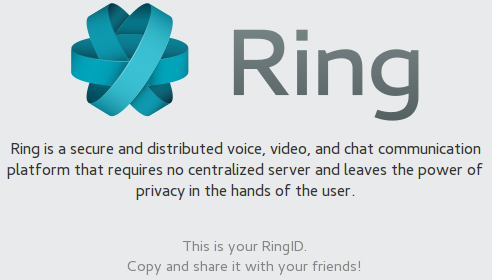The Licensing and Compliance Lab interviews Guillaume Roguez, Ring Project Director
jeudi 7 janvier 2016 à 16:37
Ring is multi-media communication platform with secured multi-media channels, that doesn't require centralized servers to work. It is developed by Savoir-faire Linux, a Canadian company located in Montréal, Québec. It is a potential free-software replacement for Skype, and possibly more.
What inspired the creation of Ring?
The way everyone perceives the world changed when Edward Snowden, Wikileaks and others started to massively warn the public about global surveillance made by our states, network control companies and so on. The need of software solutions that give back the control to user has never been as urgent as before. As citizens of democracies and professionals of free software, we are worried about how frequently this concentration of our private data is controlled by monolithic internet giants. This is a real problem for the real global economy and makes a serious roadblock to innovation. These are our main reasons to make something different.
In conjunction with these concerns, Savoir-faire Linux developed another project just before: SFLPhone. It was only usable in a centralized concept (SIP or IAX servers was necessary), and communication wasn't secured by encryption/authentication. This first experience was a good starting point to propose something more evolved. Even though Ring is currently in alpha version, it allows decentralization and secure communication, whatever the media exchanged.
All these matters are our guiding rules and we invite developers who want to join this project to contribute.
How are people using it?
Within Savoir-faire Linux, we use it as our main phone, some even only use Ring to make calls. We also use it as a video conferencing tool for our daily communications with our different branches over the world.
In our team, one of us has even built an Arduino based circuit to connect Ring to the lights of his house: he can turn them on/off from distance.
Our great beta-testers (that can be even our mum, dad, friends, ...) use Ring to make calls and they mostly use the instant message feature that they like a lot. It's fantastic to hear when someone outside of our daily job environment gives Ring a try and judges it awesome, even in the current stage alpha stage. The instant messaging is particularly used by such users.
As we're also active in local meetups (here at Montreal), where some free-software enthusiasts are present, to demonstrate our technology. First impressions make us confident in our decisions.
What features do you think really sets Ring apart from similar software?
Ring is a particular piece of software for at least three reasons:
-
The interoperability over communication protocols and the goal to make it available for anyone, not just a group of crypto-savvy enthusiasts. We target the universality concept into Ring: as an example, we don't support XMPP yet, but there is nothing in the design that could block it's implementation. Developers are welcome!
-
The fact we intend to support decentralization (DHT) and industrial standards like SIP in the same application.
-
Our layered design permits the use of its low-level core to make something completely different from our current clients. Ring allows prospects with the Internet of Things.
Why was the GPLv3 chosen as Ring's license?
Ring comes from SFLPhone, already under GPLv3 license. It was always obvious to use it for Savoir-faire Linux, especially when we are looking at the goals of the Ring software. So it has always be evident to use GLPv3 if we think about the goals of the software itself:
- To be "hackable": re-use for your needs, provides seeds of our near future.
- To let people see what we do at SFL: we provide skills; software is just a tool or an artefact of that.
Only GPL can give the necessary guarantees to achieve that.
How can users (technical or otherwise) help contribute to Ring?
The most important is to use our available front-ends for your daily usage. Replace non-free solutions and grow the mesh: it's so important due to the distributed nature of Ring. We need to grow to securise (secure) the DHT mesh.
Immediately after this, comes the translation of Ring: better accessibility is a key of the wide usage success. Then we're free software, so the code is ready for «happy-hacking» . We're waiting for security analysis, enhancements, patchsets, ... pick up the code and let us know what you think about it. For sure we try to do that everyday, but we're a relatively small team to realize all these tasks.
Community, we're waiting for you help!
For that we propose various public tools:
-
General information: https://ring.cx : find binary packages, documentation links, news, ...
-
Discussion:
- Mailing List : https://lists.savoirfairelinux.net/mailman/listinfo/ring
-
IRC : #ring on freenode.org
-
Development:
- Issue tracking : https://tuleap.ring.cx/projects/ring/
-
Patchset review and repository firewall : https://gerrit-ring.savoirfairelinux.com
-
Online translation: https://www.transifex.com/savoirfairelinux/ring/
What's the next big thing for Ring?
As Ring is in alpha development stage, we always have ideas to improve or enhance it, so the list is long. In the immediate future we want to deliver an Android version of our front-end. After that we have discussion channels (chat) in a generic way (during a call, a conference, "out-of-call", ...). Then fast and secure file sharing (that comes after a way to propose a warranted generic data stream channel). Right after, we are working on a way to provide a "distributed services" framework: DNS, routing or whatever anyone is able to dream about the final usage, we want to provide a solid solution to make it real. We plan to enter in beta stage in the early of part 2016 sprint.
Enjoy this interview? Check out our previous entry in this series, featuring Michael Lissner and Brian Carver of RECAP The Law.